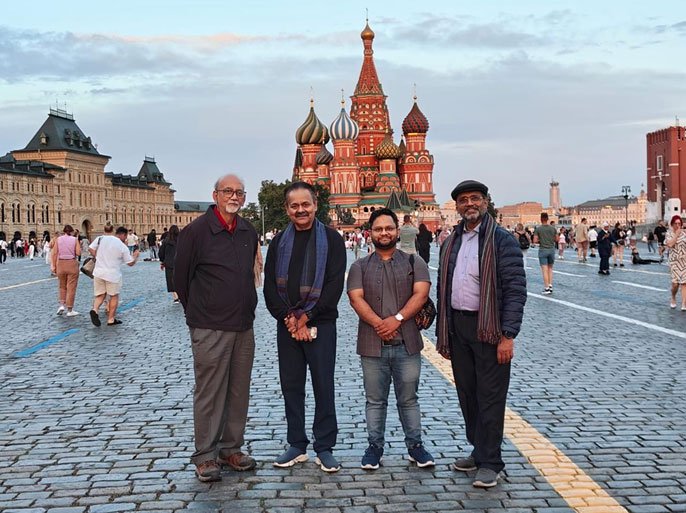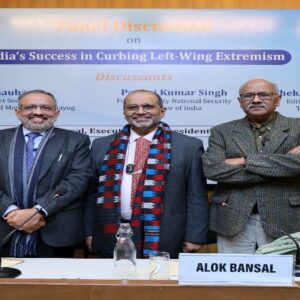India Foundation delegation, led by Vice Admiral Shekhar Sinha, Chairman of the Board of Trustees, India Foundation and included, Captain Alok Bansal, Director, India Foundation, Shri DP Srivastava, Former Ambassador of
India to the Islamic Republic of Iran and Dr Pavan Chaurasia, Research Fellow, India Foundation participated in a two-day trilateral conference titled “The Elaboration of the North-South Transport Corridor: Concept and Its Implementation.” The conference took place from June 20-21, 2024, in Moscow, Russia and was organized by Institute of Scientific Information for Social Sciences of the Russian Academy of Sciences (INION RAS), a leading think tank based in Moscow, Russia in collaboration with India Foundation and included delegates from Institute for Political and International Studies (IPIS), Iran. The first day commenced with the welcome remarks from Prof Alexey V. Kuznetsov, a corresponding member of INION RAS, and Dr Ali Chegeni, the head of the Iranian delegation. On behalf of India Foundation, Captain Alok Bansal expressed gratitude to INION for organizing the conference and managing the logistics. He conveyed optimism that the discussions would yield meaningful results and a framework beneficial to the future of the North-South Transport Corridor.
In the first session, Vice Admiral Shekhar Sinha spoke on the theme “Security Dynamics of Transport Corridor with Special Focus on INSTC.” He underscored the importance of addressing the security impediments to ensure the success of the transport corridor. Vice Admiral laid emphasis on the fact that various risks—including illegal migration, narcotics trafficking, piracy, substandard vehicles, and proliferation—must not be overlooked. Several solutions to mitigate these security threats were also proposed.
Ambassador DP Srivastava gave a presentation on the topic of “Russia, Central Asia, and the International North-South Transport Corridor (INSTC).” He underscored the numerous advantages associated with the INSTC, including, among others, a reduction in costs due to shorter distances and expedited deliveries, enhanced market access leading to the emergence of new markets, the establishment of regional supply chains across Eurasia, as well as the formulation of regional free trade agreements (FTAs).
On the second day of the conference, Captain Alok Bansal delivered a compelling presentation on the topic “Significance of Chabahar Port for India and Feasibility of its Linkage with INSTC”. In his presentation, he mentioned that the need for the International North-South Transport Corridor (INSTC) was framed as driven more by geopolitical considerations than geographical ones. Collaboration among participant nations was emphasized as essential for the corridor’s success, along with the necessity of a strong political will. India’s stance against China’s Belt and Road Initiative (BRI) was articulated, citing violations of its sovereignty and unaddressed concerns regarding its implications.
The Russian delegation highlighted that INSTC is a win-win for all the three parties and that it has a historic aspect that dates back from fifteenth century about the route from Damascus to Basra to India. It was emphasised that the Bandar Abbas port in Iran, which was being developed is a very critical component of INSTC and it is necessary to construct a railway line to the port for the goods to be carried. It was also mentioned that Azerbaijan could become a key element for the success of INSTC as it serves as a strategic transit hub within the INSTC framework and that its location allows for the facilitation of trade routes connecting the Caspian Sea to the Persian Gulf and further into Europe.
The Iranian delegation intensively delved into the topic of INSTC and Chabahar port. In one of the presentations made by the Iranian delegation, it was mentioned that there were three major corridors that connected Asia to Europe namely The Silk Road Economic Belt, the Trans-Siberian Railway and The Northern Sea Route. However, after the Russia-Ukraine conflict, middle corridors have become much more important and therefore the world has seen a surge in the development of middle corridors. It was argued that there are certain lessons that need to be drawn from the present context, most importantly being that mini-lateralism between India, Russia and Iran can work wonders, of which INSTC is a glaring example.
Apart from this, various topics like trade, banking, maritime security, connectivity were also discussed in the conference. The perspectives of all the three participating delegations on different issues were brought about by the speakers in different sessions. The conference concluded with all sides expressing confidence to carry forward these discussions and holding the next one very soon.





